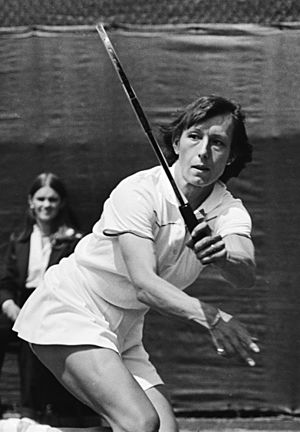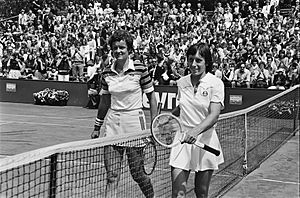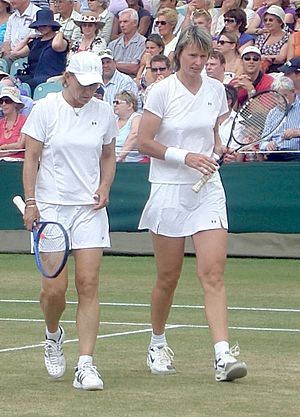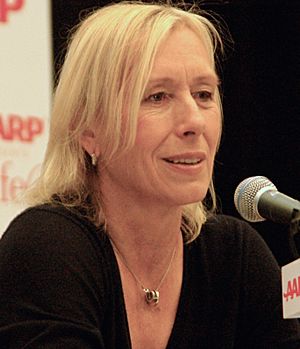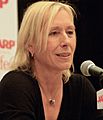Martina Navratilova facts for kids
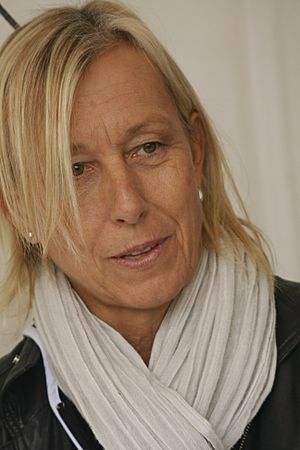
Navratilova at the Eastbourne International, June 2011
|
|
| Country (sports) |
|
|---|---|
| Residence | Miami, Florida, US |
| Born | October 18, 1956 Prague, Czechoslovakia |
| Height | 5 ft 8 in (173 cm) |
| Turned pro | 1974 |
| Retired | 2006 |
| Plays | Left-handed (one-handed backhand) |
| Prize money | US$21,626,089
|
| Int. Tennis HoF | 2000 (member page) |
| Singles | |
| Career record | 1442–219 (86.82%) |
| Career titles | 167 (Open era record) |
| Highest ranking | No. 1 (July 10, 1978) |
| Grand Slam singles results | |
| Australian Open | W (1981, 1983, 1985) |
| French Open | W (1982, 1984) |
| Wimbledon | W (1978, 1979, 1982, 1983, 1984, 1985, 1986, 1987, 1990) |
| US Open | W (1983, 1984, 1986, 1987) |
| Other tournaments | |
| Tour Finals | W (1978, 1979, 1981, 1983, 1984, 1985, 1986Mar, 1986Nov) |
| Doubles | |
| Career record | 747–143 (83.93%) |
| Career titles | 177 (Open era record) |
| Highest ranking | No. 1 (September 10, 1984) |
| Grand Slam doubles results | |
| Australian Open | W (1980, 1982, 1983, 1984, 1985, 1987, 1988, 1989) |
| French Open | W (1975, 1982, 1984, 1985, 1986, 1987, 1988) |
| Wimbledon | W (1976, 1979, 1981, 1982, 1983, 1984, 1986) |
| US Open | W (1977, 1978, 1980, 1983, 1984, 1986, 1987, 1989, 1990) |
| Other doubles tournaments | |
| Tour Finals | W (1977, 1978, 1980, 1981, 1982, 1983, 1984, 1985, 1986Nov, 1987, 1988, 1989, 1991) |
| Olympic Games | QF (2004) |
| Mixed doubles | |
| Career titles | 15 |
| Grand Slam mixed doubles results | |
| Australian Open | W (2003) |
| French Open | W (1974, 1985) |
| Wimbledon | W (1985, 1993, 1995, 2003) |
| US Open | W (1985, 1987, 2006) |
| Team competitions | |
| Fed Cup | W (1975, 1982, 1986, 1989) |
| Coaching career (2014–2015) | |
|
|
Martina Navratilova (born October 18, 1956) is a famous Czech-American former professional tennis player. Many people consider her one of the greatest tennis players of all time. She was ranked the world's number one player in singles for 332 weeks. This is the second-longest time ever! She also held the number one spot in doubles for a record 237 weeks.
Martina won an amazing 167 singles titles and 177 doubles titles during her career. These are both records for the Open Era of tennis. She also won 59 major titles, including 18 in singles, 31 in women's doubles, and 10 in mixed doubles. Her nine Wimbledon singles titles are an all-time record. Martina and her great rival, Chris Evert, were the top players in women's tennis for much of the 1980s.
Martina won six major singles titles in a row between 1983 and 1984. She also achieved a Grand Slam in doubles during this time. In 1983, she had an incredible winning percentage of 98.9%, winning 86 out of 87 matches. She also had a winning streak of 74 matches in a row. Martina reached the Wimbledon singles final 12 times, including nine years in a row from 1982 to 1990. She is one of only three tennis players to win a "Boxed Set". This means winning all four major tournaments in singles, doubles, and mixed doubles. She won her last major title, a mixed doubles crown, at the 2006 US Open, just before her 50th birthday. This was 32 years after her first major title in 1974.
Martina was born in Czechoslovakia. In 1975, when she was 18, she asked the United States for political asylum and became a US citizen in 1981. In 2008, she also became a Czech citizen again, so she now has dual citizenship. Martina has been a strong supporter of human rights and other causes.
Early Life and Tennis Beginnings
Martina Šubertová was born in Prague, Czechoslovakia. Her parents divorced when she was three. Her mother, who was a talented gymnast and tennis player, moved the family to Řevnice. In 1962, her mother married Miroslav Navrátil, who became Martina's first tennis coach. Martina then took her stepfather's last name, becoming Martina Navrátilová.
Martina started hitting a tennis ball against a wall when she was four years old. She began playing tennis regularly at age seven. In 1972, at 15, she won the Czechoslovakia national tennis championship. She started playing on the professional tour in 1973. Her early success in major tournaments was on clay courts at the French Open. She reached the quarterfinals there in 1973 and 1974.
Professional Tennis Career
Starting Her Career
Martina won her first professional singles title in Orlando, Florida, in 1974 when she was 17. In 1975, she was the runner-up at two major singles tournaments: the Australian Open and the French Open.
After playing in the semifinals of the US Open in September 1975, 18-year-old Martina decided to leave communist Czechoslovakia. She was granted temporary residence in the United States and became a US citizen in 1981. In 1975, Martina also won her first major doubles title at the French Open with Chris Evert. They won the Wimbledon women's doubles title together in 1976.
Wimbledon Champion and World No. 1
Martina won her first major singles title at Wimbledon in 1978. She beat Chris Evert in a close final. This win made her the world's number one player for the first time. She won Wimbledon again in 1979, beating Evert in the final once more. This helped her finish 1979 as the world's number one player.
In 1981, Martina won her third major singles title at the Australian Open, again defeating Chris Evert. She also reached the US Open final that year. In 1982, Martina won both Wimbledon and the French Open.
Years of Dominance
After improving her fitness and mental game, Martina became the most dominant player in women's tennis. In 1983, she had an amazing year, losing only one singles match and winning 86. This was the best winning percentage for a professional tennis player since 1968. From 1982 to 1984, she lost only six singles matches in total. She also won 13 matches in a row against her main rival, Chris Evert.
In 1984, Martina won the French Open, meaning she held all four major singles titles at the same time. This is a huge achievement in tennis. She continued her winning streak in major singles tournaments, winning Wimbledon and the US Open that year. This made her the first player to win major titles on clay, grass, and hard courts in the same year. Her incredible 74-match winning streak was finally broken at the 1984 Australian Open.
In 1984, Martina also achieved a calendar Grand Slam in women's doubles with her partner Pam Shriver. They had an amazing 109-match winning streak between 1983 and 1985. Martina was the world's number one doubles player for over three years in the 1980s. From 1985 to 1987, she reached the singles final at 11 major tournaments, winning six of them. She reached the Wimbledon final nine times in a row from 1982 to 1990.
Rivalries with Other Greats
Martina had famous rivalries with other top players. Her matches against Chris Evert were legendary. Many people consider their 1985 French Open final one of the best women's matches ever. Martina and Chris played 80 matches against each other, with Martina winning 43 of them.
Later, Martina had a strong rivalry with Steffi Graf. In 1986, Martina beat 17-year-old Steffi Graf in a thrilling semifinal at the US Open. Martina also won the WTA Tour Championship that year and finished as the world's number one player for the fifth year in a row.
In 1987, Steffi Graf won more tournaments, but Martina defeated Graf in the finals of both Wimbledon and the US Open. At the US Open, Martina achieved a rare "Triple Crown" by winning the singles, women's doubles, and mixed doubles titles at the same event. Even though Graf later broke some of Martina's records for weeks at number one, Martina won many more total titles (singles, doubles, and mixed) than Graf.
In 1988, Graf won all four major singles titles, beating Martina in the Wimbledon final. In 1989, Graf and Martina met in the finals of Wimbledon and the US Open, with Graf winning both. Despite their age difference, Martina won 9 out of 18 singles matches against Graf and 5 out of 9 major singles matches. Martina's last major win against Graf was at the 1991 US Open semifinals.
Last Major Singles Title and Retirement
Martina's last Grand Slam singles victory was at Wimbledon in 1990. At 33 years old, she won her ninth Wimbledon singles title, which is an all-time record. She retired from full-time singles competition in 1994. She was inducted into the International Tennis Hall of Fame in 2000.
After 2000, Martina returned to play mostly doubles events. In 2003, she won mixed doubles titles at the Australian Open and Wimbledon. This made her the oldest major champion ever at 46 years and 8 months old. The Australian Open win also meant she completed a "boxed set" of major titles. The Wimbledon win tied her with Billie Jean King's record of 20 Wimbledon titles across all categories.
Martina played her last matches at Wimbledon on July 6, 2006. She ended her career by winning the mixed doubles title at the 2006 US Open with Bob Bryan. She was almost 50 years old, breaking her own record as the oldest major champion.
Martina won 167 top-level singles titles and 177 doubles titles, more than any other player in the Open Era. She won 18 major singles titles: nine at Wimbledon, four at the US Open, three at the Australian Open, and two at the French Open. She is the only player to win at least one tour event for 21 years in a row. Her career singles match win total of 1,442 is the most in the Open Era.
Playing Style and Coaches
Martina Navratilova was known for her aggressive serve and volley style of play. This meant she would hit a powerful serve and then quickly run to the net to hit the next shot.
Chris Evert once said that Martina "changed the game with her amazing athleticism and aggressive style." She brought a new level of fitness to tennis with her training methods.
Martina had many coaches throughout her long career, including Miroslav Navrátil, Renée Richards, Mike Estep, and Craig Kardon.
Coaching Career
In December 2014, Martina joined Agnieszka Radwańska's coaching team. However, they decided to part ways in April 2015.
Personal Life
Martina has written several books. In 1985, she released her autobiography, Martina, co-written with George Vecsey. She also wrote a tennis instruction book called Tennis My Way in 1982. Later, she wrote three mystery novels: The Total Zone (1994), Breaking Point (1996), and Killer Instinct (1997). Her most recent book is a health and fitness guide called Shape Your Self (2006).
An ESPN documentary called Unmatched was made about her rivalry with Chris Evert. Their friendship is also described in the book The Rivals by Johnette Howard and the children's book Martina and Chrissie by Phil Bildner.
Health and Well-being
In September 1982, Martina had an illness called toxoplasmosis, which affected her performance at the US Open. She started wearing glasses in 1985, and they became a well-known part of her image.
In April 2010, Martina announced she was being treated for breast cancer. She had surgery and radiation therapy. In December 2010, she was hospitalized after developing high altitude pulmonary edema while climbing Mount Kilimanjaro.
In January 2023, Martina was diagnosed with both throat and breast cancer. After receiving treatment, she announced in March 2023 that she was cancer-free.
Activism and Opinions
Martina Navratilova is involved with many charities that support animal rights, children in need, and human rights. She is also an ambassador for AARP, helping people live active and healthy lives.
Advocacy for Rights
Martina has been a strong advocate for human rights. She spoke at the March on Washington for Lesbian, Gay and Bi Equal Rights and Liberation in 1993. In 2000, she received the National Equality Award from the Human Rights Campaign.
She is also a supporter of The Lesbian Project, an organization that works for the rights of lesbians in the UK.
Political Views
Martina is a strong opponent of communism. She has spoken out against the Soviet Union's control over her home country, Czechoslovakia. She believes in speaking out when she sees something she doesn't like, because she can do that in a free country.
Views on Transgender Athletes
Martina has expressed her views on allowing transgender women to compete in women's sports. She believes that more research is needed to create fair rules for everyone. She has called for a discussion based on science, not just feelings.
In 2019, the BBC aired a program called "The Trans Women Athlete Dispute with Martina Navratilova." In it, she interviewed athletes and researchers to explore different viewpoints on the topic. She concluded that it's important to include as many transgender athletes as possible while keeping sports fair.
In August 2020, Martina signed a letter supporting a law in Idaho that prevents transgender women student athletes from competing in female sports. In 2021, she became a leader of the Women's Sports Policy Working Group. This group aims to protect girls and women in competitive sports while finding ways to include transgender athletes.
Career Statistics
Grand Slam Singles Finals: 32 (18 Wins – 14 Losses)
By winning the 1983 US Open title, Martina Navratilova achieved the career Grand Slam. This means she won all four major tennis tournaments at least once in her career. She was only the seventh woman in history to do so.
| Result | Year | Championship | Surface | Opponent | Score |
|---|---|---|---|---|---|
| Loss | 1975 | Australian Open | Grass | 3–6, 2–6 | |
| Loss | 1975 | French Open | Clay | 6–2, 2–6, 1–6 | |
| Win | 1978 | Wimbledon | Grass | 2–6, 6–4, 7–5 | |
| Win | 1979 | Wimbledon (2) | Grass | 6–4, 6–4 | |
| Loss | 1981 | US Open | Hard | 6–1, 6–7(4–7), 6–7(1–7) | |
| Win | 1981 | Australian Open | Grass | 6–7(4–7), 6–4, 7–5 | |
| Win | 1982 | French Open | Clay | 7–6(8–6), 6–1 | |
| Win | 1982 | Wimbledon (3) | Grass | 6–1, 3–6, 6–2 | |
| Loss | 1982 | Australian Open | Grass | 3–6, 6–2, 3–6 | |
| Win | 1983 | Wimbledon (4) | Grass | 6–0, 6–3 | |
| Win | 1983 | US Open | Hard | 6–1, 6–3 | |
| Win | 1983 | Australian Open (2) | Grass | 6–2, 7–6(7–5) | |
| Win | 1984 | French Open (2) | Clay | 6–3, 6–1 | |
| Win | 1984 | Wimbledon (5) | Grass | 7–6(7–5), 6–2 | |
| Win | 1984 | US Open (2) | Hard | 4–6, 6–4, 6–4 | |
| Loss | 1985 | French Open | Clay | 3–6, 7–6(7–4), 5–7 | |
| Win | 1985 | Wimbledon (6) | Grass | 4–6, 6–3, 6–2 | |
| Loss | 1985 | US Open | Hard | 6–7(3–7), 6–1, 6–7(2–7) | |
| Win | 1985 | Australian Open (3) | Grass | 6–2, 4–6, 6–2 | |
| Loss | 1986 | French Open | Clay | 6–2, 3–6, 3–6 | |
| Win | 1986 | Wimbledon (7) | Grass | 7–6(7–1), 6–3 | |
| Win | 1986 | US Open (3) | Hard | 6–3, 6–2 | |
| Loss | 1987 | Australian Open | Grass | 5–7, 6–7(1–7) | |
| Loss | 1987 | French Open | Clay | 4–6, 6–4, 6–8 | |
| Win | 1987 | Wimbledon (8) | Grass | 7–5, 6–3 | |
| Win | 1987 | US Open (4) | Hard | 7–6(7–4), 6–1 | |
| Loss | 1988 | Wimbledon | Grass | 7–5, 2–6, 1–6 | |
| Loss | 1989 | Wimbledon | Grass | 2–6, 7–6(7–1), 1–6 | |
| Loss | 1989 | US Open | Hard | 6–3, 5–7, 1–6 | |
| Win | 1990 | Wimbledon (9) | Grass | 6–4, 6–1 | |
| Loss | 1991 | US Open | Hard | 6–7(1–7), 1–6 | |
| Loss | 1994 | Wimbledon | Grass | 4–6, 6–3, 3–6 |
Awards and Recognition
Martina Navratilova has received many awards for her amazing tennis career:
- She was named AP Female Athlete of the Year in 1983 and 1984.
- She was the ITF World Champion six times (1979, 1982, 1983, 1984, 1985, 1986).
- She was named WTA Player of the Year seven times (1978, 1979, 1982, 1983, 1984, 1985, 1986).
- She received the BBC Sports Personality of the Year Lifetime Achievement Award in 2003.
- In 2006, she received the Czech Sport Legend Award.
- She was included in BBC's 100 Women list in 2013.
Many experts consider Martina Navratilova to be one of the best female tennis players of all time. In 2005, Tennis magazine named her the greatest female tennis player from 1965 to 2005. Fellow tennis legend Billie Jean King said in 2006 that Martina is "the greatest singles, doubles and mixed doubles player who's ever lived."
In 2009, Martina received the Philippe Chatrier Award. This is the highest honor from the International Tennis Federation (ITF) for her contributions to tennis. In 2012, The Tennis Channel ranked her as the second greatest female tennis player of all time. In 2013, she was inducted into the National Gay and Lesbian Sports Hall of Fame.
Media Appearances
Martina Navratilova has appeared in various TV shows and documentaries. In 1983, she appeared as herself in an episode of Hart to Hart. She also appeared as herself in an episode of Will & Grace in 2000.
In November 2008, Martina was a contestant on the UK reality show I'm a Celebrity ... Get Me Out of Here!, finishing as the runner-up. In February 2012, she was a cast member on Dancing with the Stars but was the first pair eliminated. She also guest-starred in an episode of the comedy show Portlandia. In 2019, Martina had a recurring role as a horse trainer in the Netflix series, The Politician.
A documentary about Martina and Chris Evert is currently being filmed and is expected to be released in 2025.
Images for kids
See also
 In Spanish: Martina Navrátilová para niños
In Spanish: Martina Navrátilová para niños


